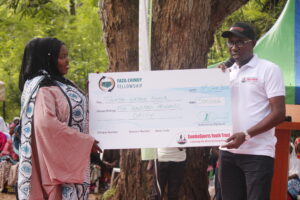By NURU SALIM
A renewed call to recognize and support widows through national legislation echoed at Msambweni Forest during the International Widows Day commemorations.
Held under the theme “Rights, Dignity, and Justice for Widows,” the event brought together hundreds of widows, activists, and community leaders who aim to press Parliament to fast-track the long-overdue Widows Bill.
According to 2019 census data, Kwale County had 16,953 widows with Msambweni alone accounting for 7,023, Kinango 5,508, and the remaining sub-counties 4,422. However, widow advocates say the numbers have since increased significantly due to the impact of the COVID-19 pandemic, which left many women bereaved and economically vulnerable.
Diana Kamande, founder of Come Together Widows and Orphans Organization said the lack of accurate, updated data has led to the exclusion of widows from policy-making and resource allocation. “Widows have never been properly counted in national statistics. You cannot design policies for people whose existence is not even officially recognized,” she said, adding that a tally of 1 million widows in Kenya has been in the records since 2019.
Kamande is spearheading efforts to table the Widows Bill in Parliament as a private member’s motion. First drafted in 2019, the bill is now backed by over two-thirds of Kenya’s leading civil society organizations, including Equality Now and CCGD.
“COVID-19 delayed the bill’s progress, but we will engage the Parliament to act on the bill. Widows deserve legal protection, visibility, and access to national resources,” she said.
At the heart of the event was the Jasiri Project, an initiative run by Tuwajali Wajane that is already changing lives on the ground. Since its launch in 2023, the project has empowered over 1,000 widows across Kwale, many of them civil servants like chiefs, doctors, and police officers through economic support, legal aid and GBV awareness.
Founder Mwanasha Gasarego said the organization currently supports 56 widow-led groups and is preparing to launch a countywide widow-mapping exercise to gather current data. “When we have accurate figures, it becomes easier to lobby the government and partners for tailored support,” she noted.
Gasarego emphasized that widows are no longer passive victims. “Widows today are more informed, bold, and organized. They understand referral pathways, and they pursue justice with confidence,” she said.
Through Jasiri, Tuwajali Wajane has disbursed KSh 619,500 in grants and soft loans. One Msambweni-based group used KSh 20,000 to launch a small-scale food and soap business, while also offering soft loans to members to support household income.
“This project changed my life. It helped me pay school fees for my child in technical college,” said Mwanasiti Bakari Dola, a widow and board member of the organization.
Tuwajali Wajane has also received KSh 500,000 from the Fazil Chinoy Fellowship to build a resource center for widows, alongside a KSh 3 million grant from CCGD for legal training and economic empowerment.
With the bill’s passage, advocates hope the government will finally identify the widows to ensure their visibility, dignity, and rightful place in national development.


